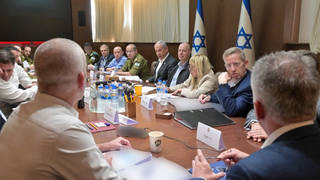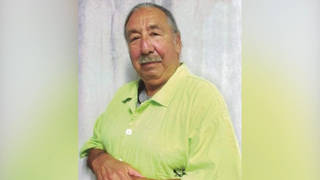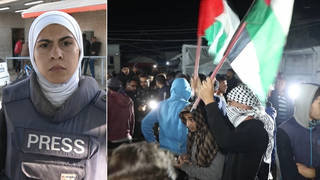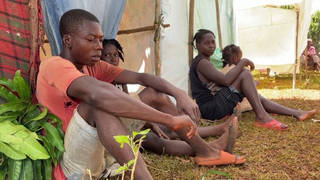
Related
By Amy Goodman with Denis Moynihan
PORT-AU-PRINCE, Haiti—Tè tremblé is Haitian Creole for “earthquake.” Its literal translation: “The earth trembled.” After the massive earthquake that devastated Haiti, the stench of death is everywhere. At General Hospital, bodies had been stacked 4 feet high near the morgue. In the community house called Matthew 25, doctors laid out a plastic tablecloth to perform a kitchen-table amputation, aided by headlamps. The injured Haitian man in his 20s might be considered fortunate: He was among the minority of injured people getting medical attention. And, unlike many amputations being performed elsewhere in Haiti, the doctors who arrived Monday were using anesthesia they had brought.
While this grim amputation was happening, an unexpected delivery of food aid arrived. Matthew 25 House typically accommodates 35 guests. Now more than 1,000 are there, camped out in the adjoining soccer field. There has been much reporting on the concerns about possible riots and violence that aid distribution might provoke. We witnessed the polar opposite, because an established community group was empowered to distribute the food. People lined up and got their supplies, leaving undisturbed the difficult surgery being conducted nearby. This has been typical as we’ve traveled through the catastrophe: People with nothing—hungry, thirsty, seeking their loved ones, burying their dead, caring for their injured—have shown fortitude, civility and compassion despite their quiet desperation.
We went to the home of Myriam Merlet, the chief of staff of the Haitian Ministry of Women. She helped draw international attention to the use of rape as a political weapon and worked with playwright and activist Eve Ensler on the V-Day movement to help end violence against women. We found her house, indeed the entire surrounding community, destroyed. “We have just pulled her body out,” they told us Sunday, five days after the earthquake. There is no telling when she died, or whether she might have been rescued. Her sister Eartha brought us to her fresh grave.
We ventured beyond Port-au-Prince, to the earthquake’s epicenter, past Carrefour to Léogâne. A United Nations assessment put the level of destruction in Léogâne at 80 percent to 90 percent of structures destroyed, with no remaining government buildings. On the way, a young man hailed our car, saying: “Please, we see some helicopters overhead, but they don’t stop here. We have no aid. We have no food.”
One man covered in dust was using a mallet to break the cement that had entombed his grandfather. A father nearby had just dug out his 1-year-old baby, dead in his playpen. According to Agence France-Presse, the U.N. warned it cannot “extend their aid operation to outlying areas until security there can be confirmed.” Traveling to Léogâne, we felt no threat; we only saw people in dire need of help. While we were in Léogâne, a missionary helicopter landed, then inexplicably lifted off again, and the crew began hurling loaves of bread to the ground. Young Haitian men grew incensed. One cried, tearing up the rolls and yelling, “We are not dogs for you to throw bones at!”
We spoke with the mayor of Léogâne, Alexis Santos, who seemed almost helpless before the near-total destruction around him. I asked him, in light of the unified front offered by the U.S. government, with President Barack Obama naming former Presidents Bill Clinton and George W. Bush to lead the U.S. response, what he thought about the offer of Jean-Bertrand Aristide—the ousted former president of Haiti—to return to Haiti from exile in South Africa to stand with Haitian President Rene Preval, a united front to help the recovery. Santos, by no means an Aristide supporter, told me he thought it would be a good idea.
Back at Matthew 25 House (named after the biblical verse “Whatever you do for my least brothers and sisters, you do for me”), I spoke with one of the surgeons. Dr. Jennifer Bruny, who flew down with other doctors from Children’s Hospital in Denver, performed the amputation earlier. The nature of the disaster, with thousands of crushing injuries, and the lack of care for so much time make amputation one of the only means available now to save lives. “This amputation should not have been necessary,” she told me. “This could have been easily treated earlier. These people needed help sooner.”
Amy Goodman is the host of “Democracy Now!,” an independent, daily global TV/radio news hour airing on more than 950 stations in the United States and around the world. She is the author of “Breaking the Sound Barrier,” recently released in paperback and now a New York Times best-seller.
© 2011 Amy Goodman











Media Options